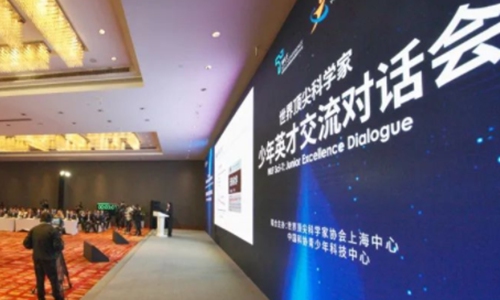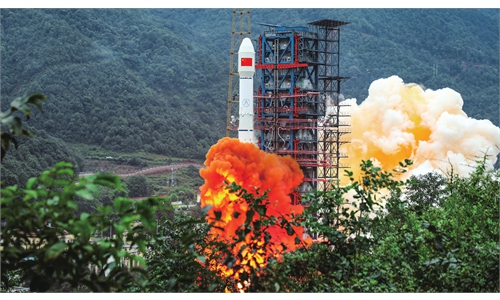
The event venue of the WLF Sci-T: Junior Excellence dialogue Photo: Sina Weibo
Li Shijia, a middle school student and passionate sports fan, has recently revealed a research project in Shanghai that tackles the assorted measuring issues in the discus throwing event.The project from the young man in Nanjing, East China's Jiangsu Province, studies the flying distance and trajectory of the discus to solve the "pain points" caused by uncontrollable conditions such as weather and site restrictions in discus sports and help athletes to train more efficiently.
The middle school was inspired to carry out the research after visiting a local track and field training center, where he saw discus athletes practicing the sport indoors due to bad weather. He immediately began conceiving a plan for an algorithm that could accurately analyze a discus' release speed and angle, and simulate the complete discus flight trajectory and predict the distance under ideal conditions.
As a teen who is very passionate about sports, Li hopes his research can contribute to the sport. He did admit, however, that he has encountered setbacks with his research.
"Discus is a traditional and popular Olympic sport, so it would be very meaningful if the computing algorithm can help develop it," Li told media.
"I've encountered many difficulties during research. Data collection and processing were very complicated, and sensors often became disconnected. I often had to go back and forth to pick up the discus because of the impact of errors on data," added Li.
His project is being supervised by a professor specializing in computer science in Nanjing University.
Li is taking part in a training program that allows excellent school students to enter university earlier. The program aims to develop innovative talents among middle school students in science and technology by giving them university-level guidance.
"It is a plan to find 'reserve talent' in this area, expanding their potential to become professionals in this area. Being a professional requires not only interest and gifts, but also rigorous academic thinking and the right methodologies. This is why having a university professor mentor is so important," Xiao Zhanping, a Chinese computer researcher, told the Global Times.
The program was co-launched by the China Association for Science and Technology and the Ministry of Education of the People's Republic of China in 2013.
Li introduced his project at the WLF Sci-T: Junior Excellence dialogue on Sunday in Shanghai. The forum was launched before the opening of the fourth Forum of The World's Top Scientists in Shanghai. The "Junior Excellence dialogue" will have 82 junior scientists present their projects to the world's top scientists before the forum was officially launched in early November.



